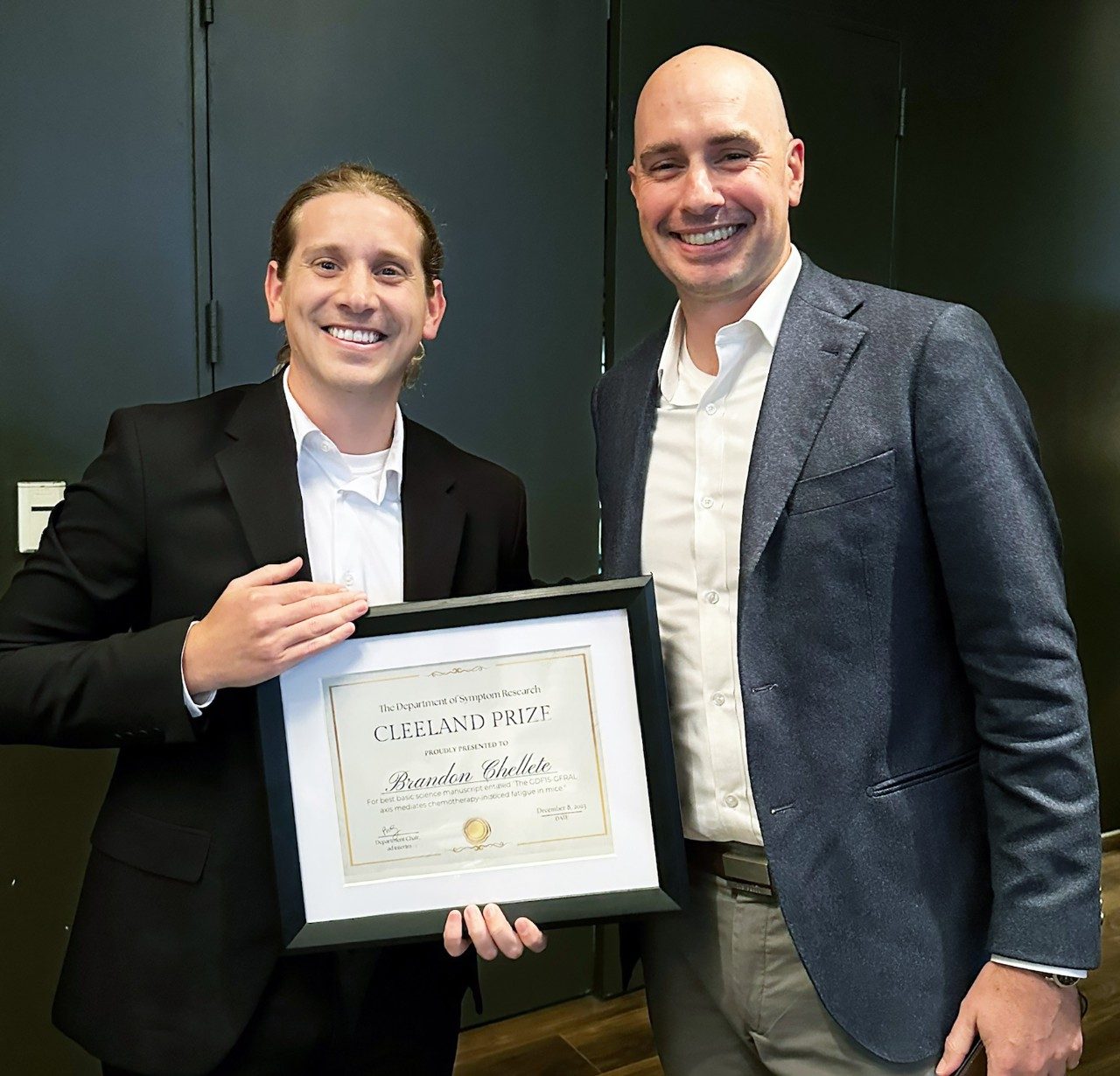
Dantzer Laboratory
Robert Dantzer, D.V.M., Ph.D.
Principal Investigator
- Departments, Labs and Institutes
- Labs
- Dantzer Laboratory
Areas of Research
- Fatigue
- Depression
- Chemotherapy-Induced Cognitive Impairments
- Cancer Neuroscience
- Mitochondria
The Dantzer Lab in MD Anderson's Department of Symptom Research has expanded the department's ongoing descriptive research and intervention trials to include animal models of fatigue, anhedonia, and cognitive impairment. The knowledge gained from this work can then be applied to the rational design of novel interventions for alleviating symptom burden in patients with cancer. Current efforts include testing the hypothesis that cancer-related fatigue emerges from a competition between the energy requirements of physical exercise and those of the tumor, exacerbated by treatment-related mitochondrial dysfunction and transmitted to the brain via mitokines.
Support Our Research
To direct philanthropic gifts to the Dantzer Lab, click the button below.
Under GIFT INFORMATION:
- Check “I’d like to choose where my donation will go”
- In the drop-down box, choose “Other” and type in “Robert Dantzer Lab”
Our Research Goal
The overall goal of the Dantzer Lab is to increase our understanding of the pathophysiology of cancer therapy-induced neurobehavioral toxicities, including depressed mood, cognitive dysfunction, and fatigue.
The overall goal of the Dantzer Lab is to increase our understanding of the pathophysiology of cancer therapy-induced neurobehavioral toxicities, including depressed mood, cognitive dysfunction, and fatigue.
Current Research
The Dantzer Lab is supported by The University of Texas MD Anderson Cancer Center and the US National Institutes of Health (National Cancer Institute and National Institute of Neurological Disorders and Stroke).
Proposed Model for Cancer-Associated Fatigue

Funding: The National Cancer Institute of the US National Institutes of Health (grant # R01CA193522: The Metabolic Basis of Cancer-Related Fatigue, and grant # R21NS130712: Mitokines as New Targets for Fatigue Induced by Mitochondrial Stress)
Image: In response to the energy demand of physical exercise, the liver maintains blood glucose levels by suppressing glucose import and glycolysis and favoring gluconeogenesis. Lactate, produced by exercising muscles, is converted to glucose via the Cori cycle, thereby providing fuel for further skeletal muscle utilization (left). In tumor-bearing mice (right), this adaptive response is suppressed as the tumor captures the Cori cycle for its own needs. This leads to decreased glucose availability and accumulation of lactate in the skeletal muscles, limiting further exertion (image adapted from Grossberg et al., Brain Behav Immun 2020).
News and Accolades

Dr. Robert Dantzer was honored with the prestigious Robert F. Gagel Lifetime Achievement Award, a recognition that underscores his immense contributions to the field of medicine and to MD Anderson specifically (Dr. Gagel led the Division of Internal Medicine from 2001-2014). The award was presented by Division of Internal Medicine Administrator Erica Pettye and Division Head David Tweardy, M.D., at the division's May 2024 Excellence Awards ceremony.
One nominators say, “Dr. Dantzer is a great mentor and serious about education. He is an inspiration and a model of academic rigo and inquisitiveness, and he retains a sharp eye for scientific opportunities across the spectrum of cancer care.”
Dr. Dantzer's groundbreaking work has reshaped our understanding of the intricate connections between the brain, immune system, and behavior. Initially trained as a veterinarian, his work with farm animals led him to investigate stress in animals and the psychobiology of adaptive behaviors. This work paved the way for groundbreaking research on the neuroimmune mechanisms underlying sickness and depression.
“The idea is that everything in our body is regulated by the brain, including the immune system,” Dantzer says. “However, if the immune system is regulated by the brain, it needs to be able to inform the brain of its activity. Therefore, there must be communication signals between the immune system and the brain.”
This insight revealed that sickness behaviors, such as fatigue and loss of appetite during illness, are not merely symptoms but motivated responses to infection, similar to emotions like fear. Inflammatory mediators in the brain influence our perceptions and actions when we are sick and behave in a sick way. This breakthrough challenged traditional views and opened new avenues in the field of psychoneuroimmunology.
From unraveling the mysteries of sickness behavior to pioneering the field of immunopsychiatry, Dr. Dantzer’s work has reshaped our understanding of the body-mind connection. He continues to explore new frontiers, driven by the same curiosity and passion that have defined his remarkable career—a testament to the power of curiosity, resilience, and independence in scientific research.

Brandon Chelette, Ph.D., a Postdoctoral Fellow in the Dantzer Lab, was awarded the inaugural Cleeland Prize for Symptom Research in December 2023. The prize honors Charles S. Cleeland, Ph.D., chair of the department from its inception in 1996 to 2015. Dr. Cleeland pioneered the use of patient-reported outcome measures to study the symptoms reported by patients with cancer. His research led to personalized interventions that dramatically improved patients' quality of life during and after treatment.
Brandon's winning article, "The GDF15-GFRAL axis mediates chemotherapy-induced fatigue in mice," shows for the first time the role of the GDF15/GFRAL axis in cisplatin-induced behaviors, suggesting that this axis could be a promising therapeutic target for the treatment of cancer-related fatigue.
Left: 2023 Cleeland Prize winner Brandon Chelette, with Symptom Research chair Peter Grace.
Join Our Lab
We highly value hard work, curiosity, innovation, teamwork and professional development in combination with a healthy work/life balance. We seek strong postdoctoral fellows to add to our team.
Open Positions
Search MD Anderson's Careers website to view open positions.
Have questions? Contact Dr. Dantzer to learn more about joining our team.

Contact Us
Mailing Address
Department of Symptom Research
1515 Holcombe Boulevard, Unit 1055
Houston, TX 77030
Phone: 713-794-5297
Fax: 832-750-5153
Physical Location
MD Anderson Cancer Center Zayed Building
6565 MD Anderson Boulevard, Suite Z8.5000
Houston, Texas 77030
Administrative Support
Administrative support (operations, grants, protocols) for the Dantzer Lab is provided by the Department of Symptom Research.
Phone: 713-745-3470
Fax: 713-745-3475
